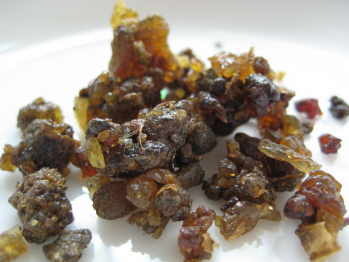Guggul
- Guggul is made from the sap (gum resin) of the Commiphora mukul tree, which is native to India. This tree has been used in Ayurvedic medicine for centuries, and Ayurvedic texts dating back to 600 BC recommend it for treating atherosclerosis.*
- Today guggul gum resin is used for arthritis, lowering high cholesterol, “hardening of the arteries” (atherosclerosis), acne and other skin diseases, and weight loss.
Contents
Benefits
- Guggul contains substances that lower cholesterol and triglycerides. One of these substances also decreases the redness and swelling that occurs in some types of acne.
Cautions
- Guggul is POSSIBLY SAFE for most people when taken by mouth appropriately. It has been used safely in clinical trials for up to 24 weeks. Some evidence also suggests that long-term use up to 75 weeks may be safe.
- It can cause side effects such as stomach upset, headaches, nausea, vomiting, loose stools, diarrhea, belching, and hiccups. Guggul can also cause allergic reactions such as rash and itching. Guggul can also cause skin rash and itching that is not related to allergy. These adverse reactions are more common with higher doses, such as 6000 mg per day.
- Pregnancy and breast-feeding: Guggul is LIKELY UNSAFE during pregnancy. It seems to encourage menstrual flow and stimulates the uterus, so some researchers worry that it might endanger the pregnancy. Not enough is known about the safety of using guggul during breast-feeding. Do not use guggul if you are pregnant or breast-feeding.
- Bleeding disorders: Guggul can slow blood clotting and might cause bleeding or bruising in people with bleeding disorders.
- Hormone-sensitive condition such as breast cancer, uterine cancer, ovarian cancer, endometriosis, or uterine fibroids: Guggul might act like estrogen in the body. If you have any condition that might be made worse by exposure to estrogen, do not use guggul.
- Underactive or overactive thyroid (hypothyroidism or hyperthyroidism): Guggul might interfere with treatment for these conditions. If you have a thyroid condition, don’t use guggul without your healthcare provider’s supervision.
- Surgery: Guggul might increase the risk of bleeding during and after surgery. Stop using guggul at least 2 weeks before a scheduled surgery.
Interactions
Major Interaction Do not take this combination:
- Estrogens interacts with GUGGUL: Large amounts of guggul might theoretically increase the side effects of estrogen.
- Some estrogen pills include conjugated equine estrogens (Premarin), ethinyl estradiol, estradiol, and others.
Moderate Interaction Be cautious with this combination
- Birth control pills (Contraceptive drugs) interacts with GUGGUL: Some birth control pills contain estrogen. Guggul might theoretically increase the side effects of birth control pills.
- Some birth control pills include ethinyl estradiol and levonorgestrel (Triphasil), ethinyl estradiol and norethindrone (Ortho-Novum 1/35, Ortho-Novum 7/7/7), and others.
- Diltiazem (Cardizem, Dilacor, Tiazac) interacts with GUGGUL: Taking guggul can decrease how much diltiazem (Cardizem) that the body absorbs. Taking guggul along with diltiazem (Cardizem) might decrease the effectiveness of diltiazem (Cardizem).
- Medications changed by the liver (Cytochrome P450 3A4 (CYP3A4) substrates) interacts with GUGGUL: Guggul might increase how quickly the liver breaks down some medications. Taking guggul along with some medications that are broken down by the liver can decrease the effectiveness of some medications. Before taking guggul talk to your healthcare provider if you are taking any medications that are changed by the liver.
- Some medications changed by the liver include lovastatin (Mevacor), atorvastatin (Lipitor), ketoconazole (Nizoral), itraconazole (Sporanox), fexofenadine (Allegra), triazolam (Halcion), and many others.
- Medications that slow blood clotting (Anticoagulant / Antiplatelet drugs) interacts with GUGGUL:Guggul might slow blood clotting. Taking guggul along with medications that also slow clotting might increase the chances of bruising and bleeding.
- Some medications that slow blood clotting include aspirin, clopidogrel (Plavix), diclofenac (Voltaren, Cataflam, others), ibuprofen (Advil, Motrin, others), naproxen (Anaprox, Naprosyn, others), dalteparin (Fragmin), enoxaparin (Lovenox), heparin, warfarin (Coumadin), and others.
- Propranolol (Inderal) interacts with GUGGUL: Guggul might decrease how much propranolol (Inderal) the body absorbs. Taking guggul along with propranolol (Inderal) might decrease the effectiveness of propranolol (Inderal).
- Tamoxifen (Nolvadex) interacts with GUGGUL: Some types of cancer are affected by hormones in the body. Estrogen-sensitive cancers are cancers that are affected by estrogen levels in the body. Tamoxifen (Nolvadex) is used to help treat and prevent these types of cancer. Guggul could theoretically affect estrogen levels in the body. By affecting estrogen in the body, guggul might decrease the effectiveness of tamoxifen (Nolvadex). Do not take guggul if you are taking tamoxifen (Nolvadex).
- Thyroid hormone interacts with GUGGUL:Guggul might increase thyroid hormone in the body. Taking guggul along with thyroid hormone pills might increase the effects and side effects of thyroid hormones.
References
Source: WebMD, “Guggul”, http://www.webmd.com/vitamins-supplements/

